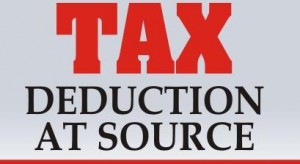In this blog post, Shruti Sharma, a Legal Associate at BetterPlace Safety Solutions Pvt. Ltd. who is currently pursuing a Diploma in Entrepreneurship Administration and Business Laws from NUJS, Kolkata, discusses the concept of TDS and the statutory obligations under the same.
What is TDS?
TDS stands for Tax Deducted at Source. It is deducted as per the Income Tax Act, 1961 for a particular accounting year. Moreover, it is the duty of payers to deduct tax before hand and then submit to our government.
Objectives of TDS
-
To avoid burden to pay tax:
The concept of TDS has enabled salaried people to pay tax as an installment every month at the time they earn which makes them pay tax on a regular basis without imposing the burden of paying tax in a lump sum.
2. Smooth functioning of government:
It helps the government get funds for whole year as they also require funds for smooth functioning.
3. Collection of taxes from assesses:
TDS helps to collect taxes when the income is paid to various assesses like contractors, professionals, etc.
Who shall deduct TDS?
If the payment comes under the purview of TDS provisions of Income Tax Act, then every person who comes under the purview has to pay TDS. An exception to the rule above is in the case of payments made under Sec.194 A, 194 C, 194 H, 194 I, 194 J. At the time of payment whether in cash, cheque or credit to the payee’s account; TDS must be deducted.
Deductor and Deductee
The person who deducts tax is called deductor and the person from whom the tax is deducted called as a deductee.
Advantages of TDS
TDS has various advantages. TDS is beneficial for both the taxpayer as well as the government.
-
Tax evasion:
TDS prevents tax evasion as it is based on the concept of “pay as and when you earn”.
2. Tax collection:
TDS widens the tax collection base.
3. Easy and effortless:
TDS deduction is the easiest tax deduction as it is automatically collected and gets deposited to the government.
Applicability of TDS
TDS is applicable on the following:
- Salary of an individual
- Income from interests on savings
- Securities and deemed dividends
- Fixed and Recurring accounts
- Income from horse racing and insurance commissions
- Lottery or game-related prize money
- NSS deposits
Minimum salary on which TDS to be deducted
Any person whose salary falls under the taxation slab is subject to TDS which means an individual earning less than Rs.2.5 lakhs is not required to pay TDS.
Steps for paying TDS
As per section 194-IA, every person (even individuals) making a payment for consideration of immovable property, not including agricultural land will withhold tax @1% of the transaction amount.
As per notification no.39/2013 dated 31 May 2013, the following things have been made clear:
- Depositing of withholding tax.
- Issuance of certificates for such tax.
- Filing a return of withholding tax.
The following procedure is followed:
The amount deducted under section 194 IA shall be deposited with the Central Government within seven days from the end of the month in which the amount was deducted. For example, if the amount is deducted on 15th June, then it shall be credited to the Central Government by 7th July. TDS payment made u/s 194-IA is to be necessarily accompanied by a challan-cum-statement in Form No.26QB.
The amount shall be deposited electronically within the time specified above with the RBI or the SBI or any other authorized bank. Deductor is liable to furnish the certificate of the tax deducted at source in Form No. 16B to the deductee within 15 days from the due date of furnishing Form No. 26 QB. TDS deductor shall provide a certificate under Form 16B which is to be generated online from the web portal.
Concept of TDS
Salaries payable by an employer are chargeable to tax in the hands of the employee and are subject to deduction of tax at source under section 192 of the Income Tax Act.
The obligation of the employer to deduct tax at source is mandatory and cannot be negotiated. But in cases where there is any failure on the part of the employer to deduct tax at source, the employee cannot escape liability to tax; he would be chargeable to tax entire income from salaries.
The fact that the employer could be proceeded against and be subject to penalty or prosecution would not absolve the employee of his liability to pay tax on the income which should have been subjected to deduction of tax by the employer. In every case, the tax deducted by the employer should be added to the employee’s income and the gross amount should be taken as the taxable income of the employee.
No deduction to be made in certain cases
Section 197 A provides that no deduction of tax at source is to be made from:
- interest on securities
- dividends
- payments in respect of deposits under NSS, etc. if the following conditions are satisfied:
- The recipient of such income is an individual and resident in India.
- Such person furnishes a declaration in writing in duplicate, in the prescribed form and verified in a prescribed manner, to the payer of such income to the effect that the tax on his estimated total income of the previous year in which such income is to be included in computing his total income will be nil.
Sub-section 197 A(1A) has been inserted with effect from June 1, 1992. This sub-section provides that in a case of interest other than interest on securities, a declaration referred to above can be furnished by any person (other than a company or a firm).
The payer of the income above will deliver to chief commissioner of Income Tax one copy of the declaration (received from the recipient of income) on or before the 7th day of the month next following the month in which the declaration is furnished. If he fails to do so, he will be liable to a penalty of an amount which shall not be less than one hundred rupees but which may extend to two hundred rupees for every day during which the default continues.
E-TDS Return
E-TDS Return is prepared in the Form Nos. 24Q, 26Q OR 27Q in electronic media as per prescribed data structure either in a floppy or a CD-ROM. FORM No. 27 A should accompany the floppy, or CD-ROM prepared should be signed and verified in a prescribed manner.
As per section 206 of the Income Tax Act, corporate and government deductors are compulsory required to file their TDS return through electronic media. However, for other deductors filing of e-TDS return is optional and e-TDS should be filed under Section 206 of Income Tax Act by a scheme dated 26 August 2003 for electronic filing of TDS return vide CBDT Circular No. 8 dated 19.09.2003. The CBDT has appointed the Director General of Income Tax (Systems) as e-filing Administrator for the purpose of electronic filing of returns of TDS Scheme, 2003.
CBDT has also appointed National Securities Depository Limited (NSDL) as an e-TDS Intermediary. E-TDS return can be filed at any of the TIN-FC opened by the e-TDS Intermediary for this purpose. The due date for filing quarterly TDS return both through electronic and conventional forms remains the same.
E-Filing of quarterly statement of TDS is mandatory for the deductors where:
- The deductor is an office of the Government.
- The deductor is the principal officer of a company.
- The deductor is a person required to get his accounts audited under section 44AB in the immediately preceding financial year; or
- The number of deductees recorded in a quarterly statement for any quarter of the financial year are twenty or more;
Other than the above, any other deductor may also opt to furnish the statement electronically.
 Serato DJ Crack 2025Serato DJ PRO Crack
Serato DJ Crack 2025Serato DJ PRO Crack












 Allow notifications
Allow notifications


